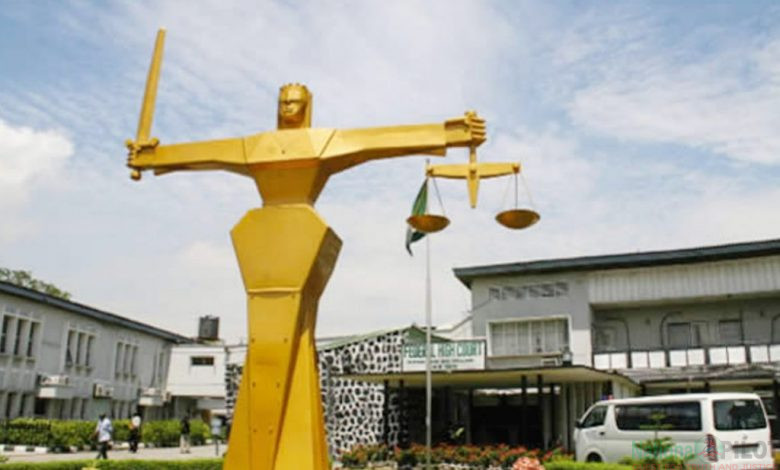LANDMARK JUDGEMENT

MAKANJUOLA v. STATE (2021) LCN/4984(SC)
In The Supreme Court
On Friday, June 04, 2021
SC.119C/2019
Before Our Lordships:
Mary Ukaego Peter-Odili – Justice of the Supreme Court of Nigeria
John Inyang Okoro – Justice of the Supreme Court of Nigeria
Ibrahim Mohammed Musa Saulawa – Justice of the Supreme Court of Nigeria
Adamu Jauro – Justice of the Supreme Court of Nigeria
Emmanuel Akomaye Agim – Justice of the Supreme Court of Nigeria
Between
Idowu Makanjuola – Appellant(s)
And
The State – Respondent(s)
Ibrahim Mohammed Musa Saulawa, J.S.C. – (Delivering the Leading Judgment):
The present appeal has emanated from the judgment of the Court of Appeal, Ilorin Judicial Division, delivered on May 18, 2018 in appeal NG. CA/IL/C.19/2017. By the judgment in question, the Court below, Coram C. N. Uwa, K. A. Barka, and B. M. Ugo, JJCA affirmed the conviction and sentence (to death) of the Appellant by the trial High Court of Kwara State.
It is posited, that Section 227 of the Administration of Criminal Justice Law, Laws of Kwara State, is designed to save the charge from non-material errors in the drafting of the charge, such as error of duplicity, non-joinder, misjoinder, et al. However, the rule is allegedly not meant to render the fundamental requirements of a charge in-operative. See IBRAHIM VS STATE (2015) 11 NWLR (Pt. 1469) et al.
MARY UKAEGO PETER-ODILI, J.S.C.: I agree with the judgment just delivered by my learned brother, Ibrahim Mohammed Musa Saulawa, JSC and to register the support in the reasonings from which the decision emanated, I shall make some remarks.
THE CASE OF THE APPELLANT
According to the Appellant, he is a DJ at Bovita Hotels and a wrist watch repairer. He was on an Okada (bike) going to Bovina hotels when he was arrested on the Okada (commercial motorbike). He was almost at the hotel when the police stopped them and asked them to come down. The police seized the bike and put the Appellant in the police vehicle and drove him to the station. On the second day, the police asked if he had relation in Ilorin and he said yes. They gave him his phone and asked him to call his relatives to come for his bail. On the arrival of his sister at the station, the police demanded for the sum of N100,000 and informed her that if she refused to pay they would charge him to Court. The sister could not pay and hence the charge. In effect, the Appellant denied knowing anything about the robbery incident and relied on a case of extortion against the police.
THE HEARING
The prosecution called five witnesses and tendered several exhibits including a locally made gun allegedly used by the appellant and his co-accused. The gun was admitted as an exhibit 2.
The dictum of this Court in a similar situation settled the issue. See NNEMEKA AGU JSC in OKAROH V THE STATE(1990) LPELR 2423, held thus: “I believe that the complain in this case can be more appropriately described and categorised as a wrongful reception of evidence. The principle applicable in such cases is settled. I should, as it were, run a blue pencil line cross the piece of evidence which has been wrongfully admitted and see whether, if the learned trial Judge has disregarded it, he could have reached the same conclusion. If I can positively say that he would have reached the same conclusion, then the wrongful admission of evidence is not one upon which an appeal should be allowed. See Section 226 (1) of the Evidence Act; R V THOMAS (1958) 3 FSC 8.
To succeed in proving the commission of the offence of conspiracy under Section 6(a) of the Robbery and Firearms Act, the Prosecution has a burden to establish the following ingredients:
(i) The existence of an agreement between two or more persons to do an illegal act or an act which is not illegal by illegal means;
(ii) That the illegal act was done in furtherance of the agreement and that each of the accused persons participated in the illegality.
In this case, a charge was filed by the prosecution alleging that the offence took place at Sawmill Area on the 15/03/2014. In proving the said offence, the prosecution called five witnesses all of whom testified that the robbery was committed at Awolowo Road, Tanke Area, on the 5/03/2014, a place and date different and distinct from the venue and the date of the offence charged. The Appellant was convicted for the offence proved at the trial which conviction was affirmed by the Court below. The appellant contended that the conviction not only breached the provision of Section 196 of ACJA but it is a fundamental violation of the Section 36(6) of the Constitution relating to fair hearing to be accorded to an accused and from which Section 196 derived its potency. Section 196 therefore has a constitutional force.
That consideration of the Court below is proper as the matter cannot be viewed in a narrow prison but in context with other surrounding circumstances and the substantial interest of justice. See Section 206 of the Criminal Procedure Law which was the law applicable at the time of the commission of the offence and the trial.
Again to be brought in, is that the defence did not raise any objection at the alleged omission before the trial Court hence it is untenable to bring it up at the Court of Appeal and there is no linkage between the omission and the fundamental rights of the appellant pursuant to Section 36(6) of the Constitution of the Federal Republic of Nigeria 1999. Also the appellant was not misled and justice was served.
The appellant’s complaint is that the defence he put up relates to the fact that he is a DJ player at Bovina Hotel and also a wrist watch repairer and the two Courts below did not consider the defence connoted.
The appellant contends that from the excerpt of the judgment of the Court below, it cannot be denied that the defence had not been raised timeously, the Court below rejected the said alibi. That the Court below, misconstrued the pivot of the appellant’s complaint before them.
From the furore of the complaints of the appellant which seem more academic than based on legal principles, it needs be restated that the Court of Appeal has a wide unfettered discretionary power to formulate its own issues in the interest of Justice, provided they relate to the grounds of appeal and flow therefrom. Stated in other words, an Appeal Court can formulate its own issues where in its opinion, the issues formulated by the parties would not justify or equitably dispose off the appeal before it. Further still, an Appeal Court can also within the same manner, prefer or adopt the issue or issues formulated by any of the parties to an appeal where same would enable it do justice to the appeal. See OMOWORARE VS. ONWORE (2010) 3 NWLR (PT. 1180), 58 AT 80; AGBARE VS. MIMRA (2008) 2 NWLR (PT. 1071) 378.
In raising the defence, appellant was obligated to meeting the legal requirements of such a plea which entails that he had to furnish the necessary particulars to the police who would embark on the investigation of either confirming the alibi or debunking it. Therefore, failure to make available those needed details translated to be alibi in the first place was within his personal knowledge and the details must be furnished at the earliest opportunity.
It is to be noted that the appellant raised his defence of alibi for the first time in Court at the point of his defence while testifying and so the Court below was on firm footing to have affirmed the decision of the trial Court on the issue. Clearly the fair hearing right of the appellant was not breached.
I resolve the issue against the appellant.
All the issues are resolved in favour of the respondent and against the appellant, the appeal lacks merit and I dismiss it. I abide by the consequential orders made.
Appeal Dismissed.
JOHN INYANG OKORO, J.S.C.: The facts giving birth to this appeal are that the Appellant together with three other persons robbed one Kamaladeen Shittu of his Kia Rio car at Awolowo Road, Tanke Area, Ilorin around 11:30 pm on 5th March, 2014 while the victim was on his way home. The car was recovered from the Appellant and his cohorts by a team of police men on patrol at sawmill garage, Ilorin barely 45 minutes after the robbery incident. Items recovered from the car in their possession were all the contents of the car as previously mentioned by the victim intact. Also recovered were 2 live cartridges, a locally made pistol, which the Appellant admitted belonged to him, and a small axe.
The facts of this case reveal that the Appellant together with his partners in crime were arrested in the stolen car on 5/3/2014 at Sawmill garage about 45 minutes after the car was stolen at Awolowo Road, Tanke area. The prosecution witnesses were consistent in their testimonies with respect to the date and scene of the event which showed beyond doubt that the car was snatched along Awolowo road, Tanke area on 5/3/2014 and not at saw mill garage on 15/3/2014 as contained in the charge.
In the instant case, I agree with my learned brother that the Appellant’s grouse was not that he took part in the robbery incident for which he was tried, but that the charge defectively claimed that the event occurred at Sawmill garage area instead of Awolowo road, Tanke area, both in Ilorin. He was not misled in the trial and I am unable to see how those minor defects prejudiced the Appellant in the trial.
ADAMU JAURO, J.S.C.: I had the privilege of reading before now the lead judgment just delivered by my learned brother, Ibrahim Mohammed Musa Saulawa, JSC. I agree with the reasoning contained therein and the conclusion arrived at.
In any event, the mere fact that he was on his way to Bovina Hotel when he was arrested is not in itself a defence to the offence charged, neither does it mean that he was not involved in the commission of the offence.
In conclusion, I join my learned brother in dismissing the appeal as same is devoid of merit. The judgment of the Court of Appeal, Ilorin Judicial Division, delivered on 18th May, 2018 in appeal No. CA/IL/C/19/2017 is hereby affirmed.
Appeal dismissed.





